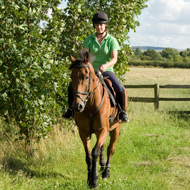Association of British Riding Schools attains charitable status

Because of the nature of its work most people, including members, had assumed that the ABRS was already a charity.
The Association of British Riding Schools (ABRS) has announced that its application for charitable status has been successful.
The ABRS made the application to the Charity Commission following their review of the structure of the association, which is now in its 60th year. The application also coincides with the appointment of the Associations' first chief executive, David Pettifor, in June 2013.
Because of the nature of its work most people, including members, had assumed that the ABRS was already a charity. The new status is a major development for the organisation as it will enable it to enhance the benefits of membership.
In order to make the application, The ABRS had to choose between two routes. The first was a more straight-forward route which involved incorporating a new company. The alternative, which the organisation chose, was to demonstrate how the ABRS had evolved into a charity over time, while retaining its original ethos.
Julian Marczak, ABRS chairman, said: “In our 60th year what better way for the ABRS to celebrate than acquiring charitable status. Following a detailed consultation process, we decided that becoming a charity would bring about a number of clear advantages to the Association, including accessibility to otherwise unavailable funding to assist with our charitable work and this was clearly identified in the application process. In addition, the availability of Gift Aid our new charitable status will create accessibility to funding opportunities which would otherwise be unavailable and we welcome the change with great enthusiasm.
“There has been much more to celebrate in the ABRS 60th anniversary including gaining access to the Register of Training Organisations, taking on the first ABRS Apprentices, continued success with the UKCC, a revival underway with the Association's own qualifications and tests, new IT systems, better communications with members and more efficient ways of integrating with Scottish members.”



 The RCVS has announced a new version of its 1CPD mobile app, with enhanced features for veterinary surgeons and veterinary nurses to record their continuing professional development.
The RCVS has announced a new version of its 1CPD mobile app, with enhanced features for veterinary surgeons and veterinary nurses to record their continuing professional development.